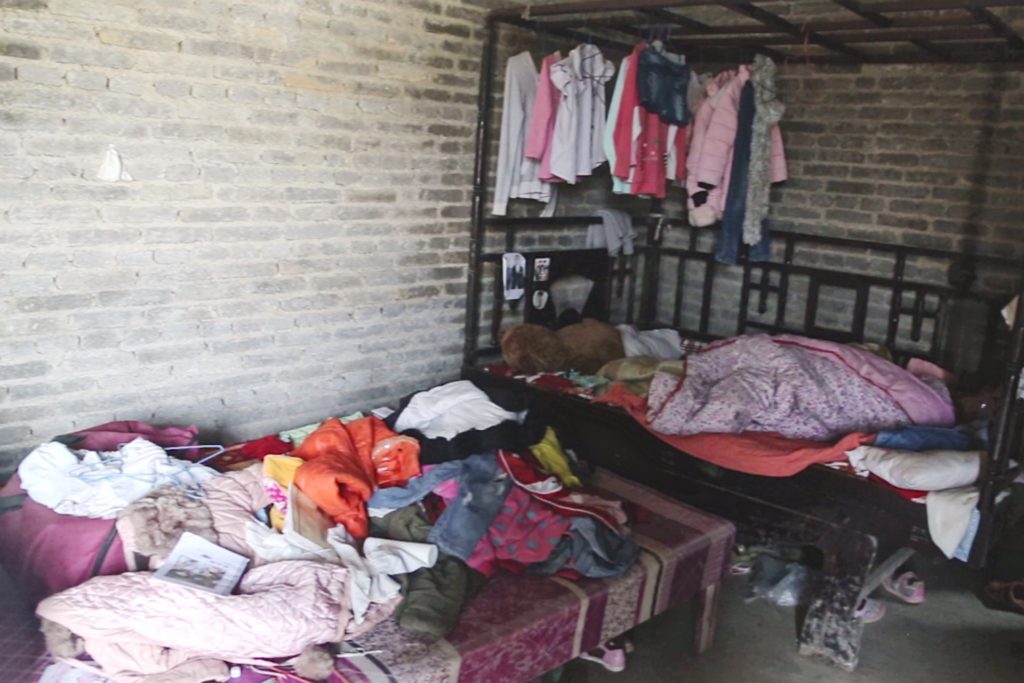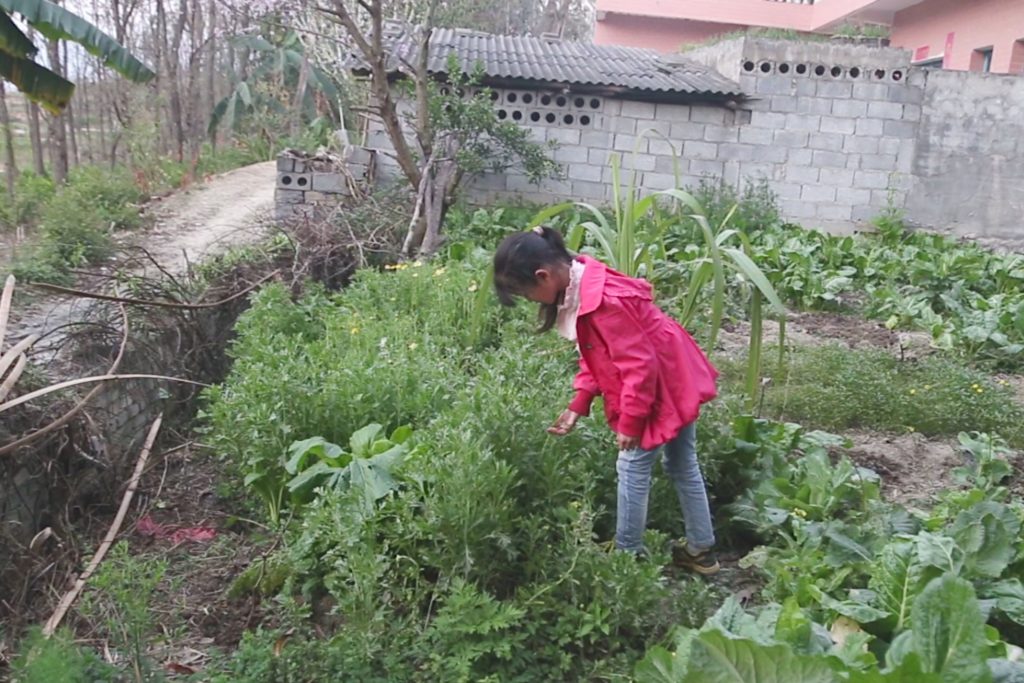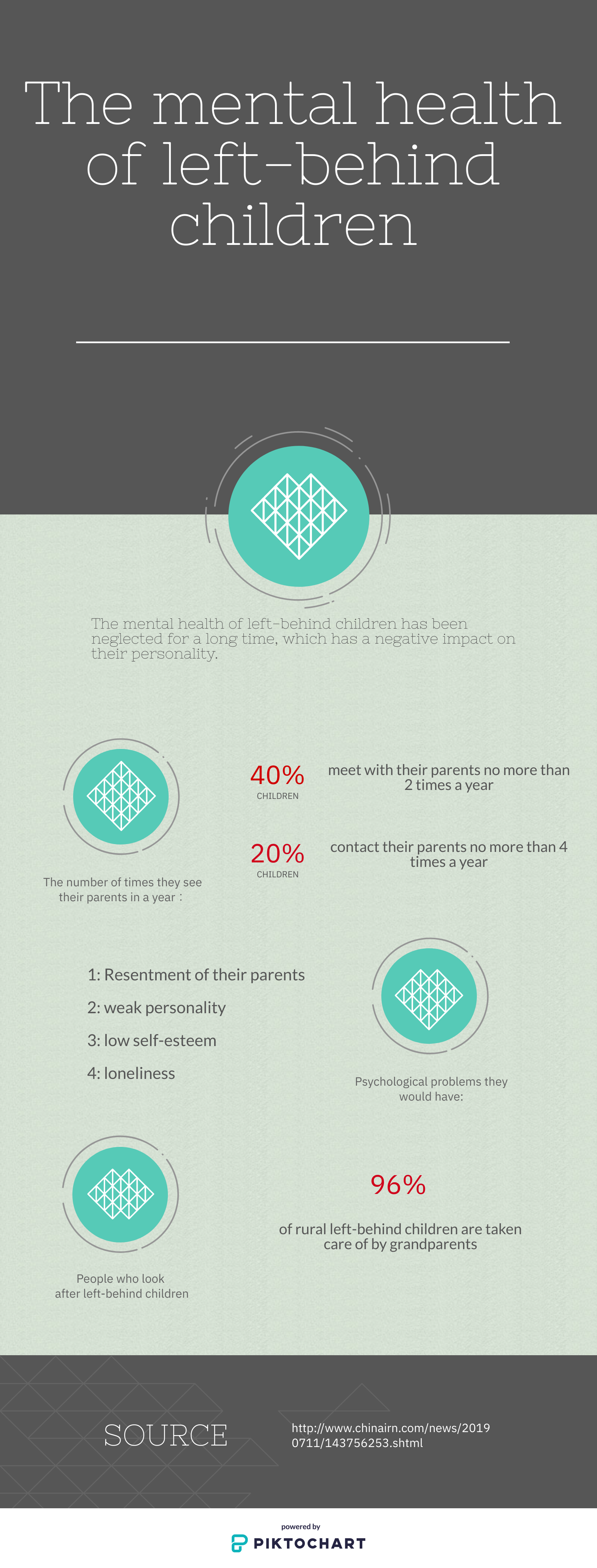Children whose parents went to cities to work were left behind in the countryside. What are the risks to these children’s mental health caused by the long-term absence of their parents?
Early one morning in 1995, Chen Li’s parents will soon leave home to work in Hangzhou, more than 2,000 kilometers away. Chen’s grandmother woke her up and asked her to say goodbye to her parents.
However, Chen blindfolded her eyes with the quilt and pretended that she was asleep. No matter how many times grandma called her, she did not answer. She thought her parents would not leave if she would not wake up.
Before her parents left, Chen had no chance to say anything to them. She stood in front of the house and saw the bus gradually disappear; her eyes filled with disappointment.
‘Why did they leave me? Why can they not take me with them?” She felt sad and angry, “I have wondered many times, if they cannot stay with me and give me their love, why did they give birth to me?” Chen, 25, often has such thoughts.
The city where their parents work is more than 2,000 kilometers away from Chen, and a ticket will cost them half a month’s salary. Therefore, her parents only return home to see Chen for around one week during the Spring Festival each year. From childhood to adulthood, her parents spent only 7-8 years with Chen.
The absence of her parents for such a long time made Chen feel a sense of crisis and insecurity. She always felt that she was not good enough or not useful to her parents when she was a child, so they left her behind in the countryside, instead of taking her with them to Hangzhou.
“I have always felt tense and dare not relax. It seems that I feel guilty as soon as I rest. I work desperately because I am afraid that somebody will think that I am useless, and then be abandoned again. My childhood experience has affected me badly,” Chen said.

Chen is a typical left-behind child, which refers to the children whose parents have moved to a big city to earn money without them. According to the Development Report of China’s Floating Population released by the National Health Commission in 2018, China’s floating population totaled 244 million in 2017, and the number of left-behind children in rural areas was almost 9 million.
Compared with those children whose parents did not leave them behind, those children whose parents did leave face prominent mental health problems, and the impact becomes more pronounced with age.
20% of those children suffer from anxiety and insecurity just like Chen, according to the China Migrant Population Development Report 2018.
The lack of family affection will have a negative impact on a children’s character. Such a view is supported by Dr Meng Yu, who specialises in children’s mental health at Sun Yat-sen University.
“Because of the grandparents of left-behind children are not highly educated and old, they only pay attention to the children’s physical needs and ignore their emotional needs”.
“Furthermore, most left-behind children have to take responsibility in taking care of their grandparents and younger sisters and brothers, and the ignorance of their emotional needs leads to such psychological problems” Said Dr Yu.
Although those children who have been left behind can now contact their parents through social media, such as WeChat, only 26.4% of them can contact their parents once a week. Most left-behind children can contact their parents even longer, and some have no contact at all, according to Dr Yu.
Moreover, the time available for these children to talk to their parents is very short. More than 50% of these children talk with their parents in just 3 minutes each time. In the process of growing up, their emotional needs have been ignored for such a long time, and their psychological problems have not received due attention. This evidently makes them feel isolated and very lonely.
Similar to Chen’s experience, when Mei was 3 years old her parents left her and went to work in Guiyang, a city in the southwestern area of China, more than 10 hours away from her. Mei’s parents only return to the village during the New Year.
Now Mei is 10 years old fourth grader attending the only primary school primary school in the village. In the past seven years, Mei could only talk to her parents on the phone once a week. Unable to communicate with her parents for such a long time, Mei became more and more withdrawn and less willing to communicate with others.

Mei’s grandmother said that she was very excited because she was about to see her parents during the Spring Festival, but Mei seems to have changed a lot. “She seldom mentioned her parents these two years and rarely asked when they would come back. I have no idea what was wrong with her, “said Mei’s grandmother.
That afternoon in PE class, Mei wrote a letter secretly to her favorite teacher, Qiang Yang, saying that, “I have become increasingly reluctant to answer my mother’s calls recently. I miss them very much, but I don’t know what to say to them.”
Qiang is so popular at school that the children would tell him all their secrets. In the past year, he has made 155 home visits to his students. Qiang has a good understanding of their students’ family and psychological status by talking with the students’ grandparents.
“Mei is now at an age that she needs her parents’ attention, but the instability of her family makes her feel insecure and lonely, which makes her unwilling and unable to express her thoughts, “Yang said.
70% of children reported experiencing significant loneliness when one or both of their parents worked in the cities and left them behind in the countryside, according to a survey on the mental health of left-behind children.
This is a unique environment to be raised in and it has a profound influence on the psychology of left-behind children. “From the perspective of them, other children can live with their parents, they can communicate and express themselves with their parents frequently, but they cannot own this kind of life. As a result, many children who are left behind will become very anxious about the future and will not be willing to communicate with others,” Dr Yu said.
Dr. Yu suggests that the problem of raising left-behind children so they grow up healthily can be solved from a micro and macro perspective. “From a micro perspective, strengthening interpersonal relationships, social support systems, communication and emotional expression with parents can all help alleviate the loneliness of left-behind children,
“From a macro perspective, such as schools and policies, studies have shown that strengthening physical exercise and increasing interpersonal interaction and communication can reduce their social anxiety,” Dr Yu said.
Dr. Yu believes that with the development of urbanization, the rural surplus labor force will inevitably move to the city. Therefore, the number of left-behind children will inevitably continue to increase for a long time to come.
Furthermore, she argues that not only should a child’s c parents and grandparents take responsibility, but schools, communities, and the government also have unshakable duties. Only through this can the mental health of those children be fundamentally stable in comparison.
“I really wanted to build a strong bond with my parents and make up for lost relationships, but I found there was a deep gap between us. I hope that one day, left-behind children will not suffer the same experience as us and can have a happy family life, ” said Chen.

